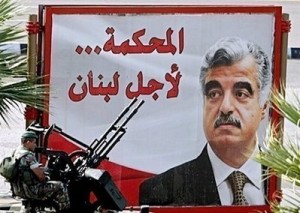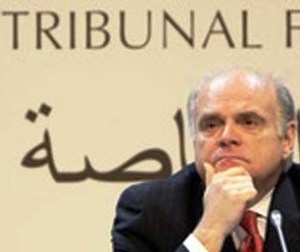
The prosecutor who filed his first indictment in the assassination of former Lebanese Prime Minister Rafik Hariri hailed the move Tuesday as a landmark in efforts to end impunity for political slayings in the strife-torn country.
Canadian prosecutor Daniel Bellemare said in a video statement that the confidential indictment at the U.N.-backed Special Tribunal for Lebanon (STL) was an important moment for the people of Lebanon, the international community and “for those who believe in international justice.”
Bellemare made the statement the day after he announced he had handed the indictment to the court’s pretrial judge Daniel Fransen for confirmation. The statement appeared aimed at cooling tensions in Lebanon, where many people fear the charges could lead to fresh violence.
Bellemare said he had made good on a promise to the people of Lebanon to do “everything that is humanly and legally possible” to bring the assassins to justice.
Many people expect members of the Shiite militant group Hezbollah to be identified in Bellemare’s indictment. Hezbollah has denied any involvement in the Feb. 14, 2005, truck bombing that killed Hariri and 22 others on Beirut’s Mediterranean sea front.
The Iran- and Syria-sponsored Hezbollah calls the tribunal a conspiracy by Israel and the United States.
The contents of the draft indictment filed Monday were not revealed and may not become public for weeks as Belgian judge Fransen decides whether there is enough evidence for a trial.
Bellemare urged Lebanese people not to speculate about the contents of the indictment as Fransen may still reject it or demand more evidence before confirming the indictment and publishing its contents.
A public guessing game about who Bellemare would indict and a dispute over whether the government in Beirut should support the tribunal has stoked political turmoil in Lebanon that boiled over last week when Hezbollah toppled the Western-backed administration of Hariri’s son, Saad.
Bellemare also paid tribute in his statements to victims of Lebanon’s violence.
“Many attacks have been made against the tribunal but you were not shaken,” he said. “You kept your hope alive; you continued to believe in the tribunal, its independence and professionalism. Thank you.”
“Many attacks have been made against the tribunal but you were not shaken,” he said. “You kept your hope alive; you continued to believe in the tribunal, its independence and professionalism. Thank you.”
The Netherlands-based court has faced a barrage of criticism from opponents in Lebanon and some of its staff were assaulted last year while conducting investigations.
Bellemare also defended the speed of the investigation, which has taken nearly six years, saying “justice cannot be rushed. The evidence must be credible and compelling.”
U.S. President Barack Obama on Monday urged all Lebanese leaders and factions to preserve calm and exercise restraint, and said the tribunal must be allowed to continue its work without interference and coercion.
“Any attempt to fuel tensions and instability, in Lebanon or in the region, will only undermine the very freedom and aspirations that the Lebanese people seek and that so many nations support,” Obama said.
Lengthy negotiations lie ahead between Lebanon’s factions as they attempt to build a new government.
 According to Lebanon’s power-sharing system, the president must be a Christian Maronite, the prime minister a Sunni and the parliament speaker a Shiite. Each faith makes up about a third of Lebanon’s population of 4 million.
According to Lebanon’s power-sharing system, the president must be a Christian Maronite, the prime minister a Sunni and the parliament speaker a Shiite. Each faith makes up about a third of Lebanon’s population of 4 million.
Hariri, a Sunni, is staying on as a caretaker prime minister as a new government is formed.
The leader of Hezbollah on Sunday defended the decision to bring down Lebanon’s government, saying his movement did so without resorting to violence. The speech by Sheik Hassan Nasrallah — who commands an arsenal that far outweighs that of the national army — appeared aimed at reducing tensions at a time when many Lebanese fear another outbreak of civil conflict.
In an earlier speech, Nasrallah said the group “will cut off the hand” of anyone who tries to arrest any of its members.
After Rafik Hariri’s assassination, suspicion immediately fell on neighboring Syria, since Hariri had been seeking to weaken its domination of the country.
Syria has denied having any role in the murder, but the killing galvanized opposition to Damascus and led to huge street demonstrations that helped end Syria’s 29-year military presence. AP
Here is a full transcript of the video statement
STL Prosecutor Daniel A. Bellemare video statement following filing of indictment
The Hague, 18 January 2011
Yesterday I signed an indictment in the Hariri case and filed it with the Registrar for transmission to the Pre-Trial Judge.
In doing so, I have made good on the first part of my promise to the People of Lebanon when I left Beirut on 28 February 2009. At that time, I said that “My team and I will do everything that is humanly and legally possible to ensure that the truth emerges and that those responsible for the crimes that fall within our jurisdiction are (…) brought to justice”.
This is an important moment for the People of Lebanon.
It marks the launch of the judicial phase of the Tribunal’s work. For the first time, a legal case has been launched by an international Tribunal against those responsible for a political assassination in Lebanon. This step has been taken at the request and on behalf of the People of Lebanon and in fulfillment of a mandate from the United Nations Security Council.
This is also an important moment for the international community – and for those who believe in international justice.
It has been a long process; but you have been patient. Thank you.
To all the victims, a special word of thanks.
Many attacks have been made against the Tribunal but you were not shaken: you kept your hope alive; you continued to believe in the Tribunal, its independence and professionalism. Thank you.
I know some of you think this has taken a long time. Yet for others, the filing of an indictment comes too soon. Let me address these two issues.
To the first, I would say that justice cannot be rushed. The evidence must be credible and compelling. I have made it clear from the start that I would act independently and that I would be driven by the evidence alone.
To those who did not expect or want this day to come, I would say that while justice may be slow, it is deliberate.
I am enormously proud of the persistence and professionalism of my staff and grateful to them. They are all passionate about this case. I thank them for their dedication to the task, their commitment to justice for Lebanon and their sense of duty.
I also want to thank the Lebanese Authorities for their support and ongoing assistance. It has been essential.
The indictment filed yesterday represents the fruit of the hard work, under challenging circumstances, of all those involved in the process.
This is only a first step in our collective quest to end impunity in Lebanon. A quest that must be pursued through existing laws and institutions.
It is now up to the Pre-Trial Judge to review the indictment and the supporting material that we have gathered.
Confidentiality
Let me now turn to the confidentiality of the process. As frustrating as it may be, the content of the indictment must remain confidential for the time being. So, unfortunately, you will have to wait a little bit longer.
According to the Rules of the Tribunal, I cannot reveal either the charges or the name of the person or persons referred to in the indictment.
This continued confidentiality is essential as I cannot presume that the Pre-Trial Judge will confirm the indictment.
If it is confirmed, the content of the document will be made public in due course and when so ordered by the Pre-Trial Judge.
Many of your questions will be answered at that time. As the trial process unfolds, you will have the opportunity to satisfy yourselves as to the strength of the evidence that we have gathered.
In the meantime, any speculation about the contents of the indictment would be counter-productive as the Pre-Trial Judge may not agree with me.
Public Hearing
To assist him in his review, the Pre-Trial Judge may submit to the Appeals Chamber preliminary legal questions necessary to review and rule on the indictment. The Appeals Chamber may then order a public hearing, which will be limited to questions of law.
It will not deal with any of the facts contained in the indictment, the identity of any of the persons or any of the charges contained in that document.
Presumption of Innocence
This indictment is not only a first step on the road to ending impunity in Lebanon; it is also the first step of the judicial process.
Any person or persons named in the indictment are presumed innocent.
And even after the indictment is confirmed by the Pre-Trial Judge – if it is – the person or persons whose identity is contained in the document are still presumed innocent. This means that the Prosecution will have to prove before a trial court, and beyond a reasonable doubt – that they are guilty. If there is a reasonable doubt, the accused will be acquitted.
Any accused has the right to defend himself vigorously against the allegations contained in an indictment. The Office of the Defence has been created to assist the accused and their counsel in ensuring that the best possible defence is offered.
Conclusion
In conclusion, our work is far from over.
I can assure you that we will continue our mission with the same level of passion and commitment, respecting fully the rights of the victims and the accused.
Thank you.

Leave a Reply
You must be logged in to post a comment.